
Find Help
More Items From Ergsy search
-

Is chronic fatigue syndrome contagious?
Relevance: 100%
-
What is chronic fatigue syndrome?
Relevance: 96%
-

What causes chronic fatigue syndrome?
Relevance: 96%
-
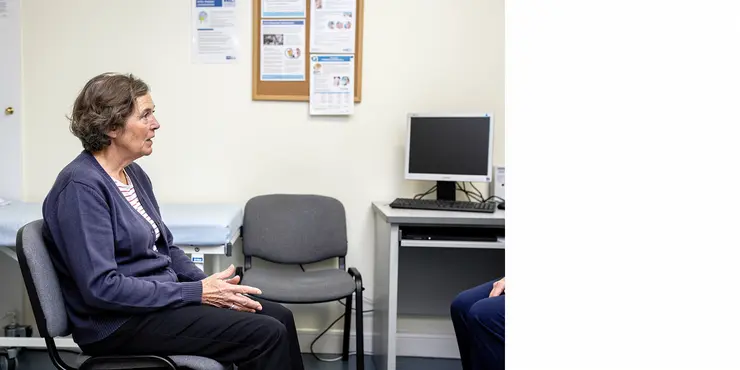
Are there psychological aspects to chronic fatigue syndrome?
Relevance: 92%
-
Is chronic fatigue syndrome a mental illness?
Relevance: 90%
-

Who is at risk of developing chronic fatigue syndrome?
Relevance: 85%
-
Can children develop chronic fatigue syndrome?
Relevance: 85%
-

What role do infections play in chronic fatigue syndrome?
Relevance: 83%
-

How is chronic fatigue syndrome treated?
Relevance: 78%
-

Is there a cure for chronic fatigue syndrome?
Relevance: 77%
-

Myalgic encephalomyelitis or chronic fatigue syndrome (ME/CFS) | NHS
Relevance: 72%
-

How is chronic fatigue syndrome diagnosed?
Relevance: 72%
-

Can chronic fatigue syndrome be managed with lifestyle changes?
Relevance: 63%
-
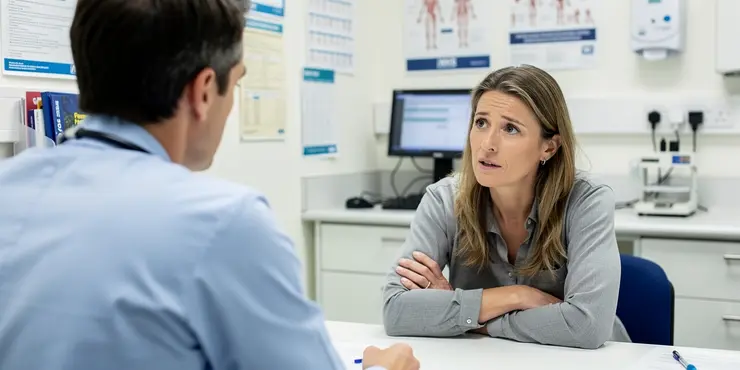
How does CFS differ from regular fatigue?
Relevance: 46%
-

What is Cushing's syndrome?
Relevance: 39%
-

What is irritable bowel syndrome (IBS)?
Relevance: 37%
-
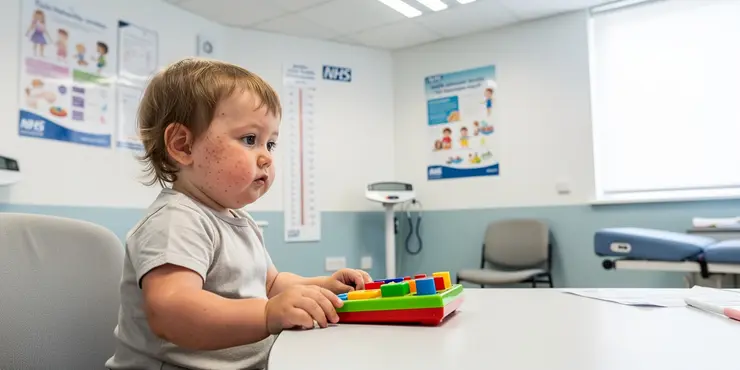
Prader-Willi Syndrome | NHS
Relevance: 35%
-

Can fatigue result in dangerous driving?
Relevance: 34%
-

Carpal Tunnel Syndrome
Relevance: 34%
-

Munchausen's syndrome | NHS
Relevance: 34%
-

Symptoms of irritable bowel syndrome (IBS)
Relevance: 33%
-
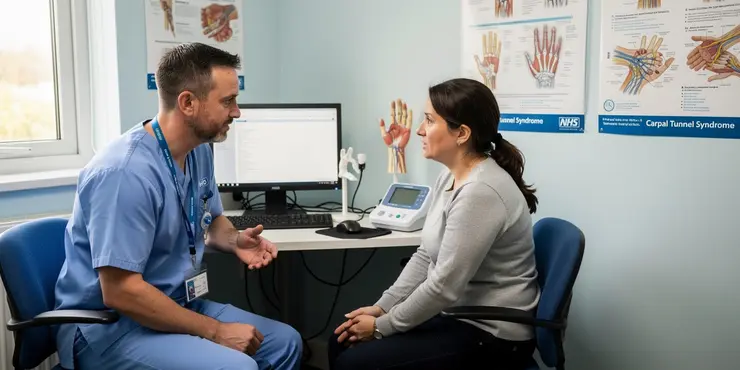
What causes Carpal Tunnel Syndrome?
Relevance: 33%
-
Can weight loss medications cause fatigue?
Relevance: 32%
-

About irritable bowel syndrome (IBS)
Relevance: 32%
-

What is Carpal Tunnel Syndrome (CTS)?
Relevance: 32%
-

Having a child with Down's syndrome | NHS
Relevance: 32%
-

Down's syndrome: Emily's story | NHS
Relevance: 32%
-
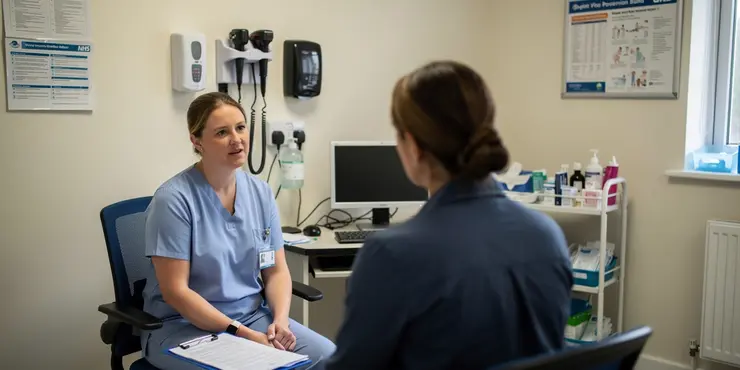
What is post-treatment Lyme disease syndrome (PTLDS)?
Relevance: 32%
-

Charles Bonnet Syndrome
Relevance: 31%
-

What is congenital rubella syndrome?
Relevance: 31%
-

Managing Chronic Illness Within the Family
Relevance: 31%
-

Is Carpal Tunnel Syndrome covered by the NHS?
Relevance: 31%
-

Turner syndrome: Beyond the classic XO phenotype
Relevance: 31%
-

Exercises for sciatica: piriformis syndrome | NHS
Relevance: 31%
-
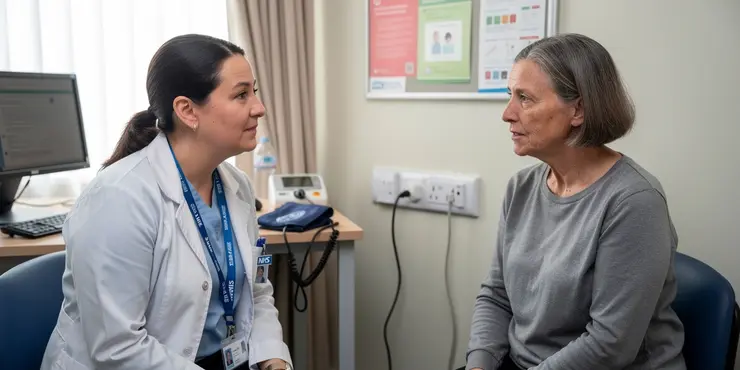
Can CFS be prevented?
Relevance: 31%
-

How is Carpal Tunnel Syndrome diagnosed?
Relevance: 31%
-

Are there any alternative treatments for Carpal Tunnel Syndrome?
Relevance: 31%
-

What is complex sleep apnea syndrome?
Relevance: 31%
-

What is complex sleep apnea syndrome?
Relevance: 31%
-
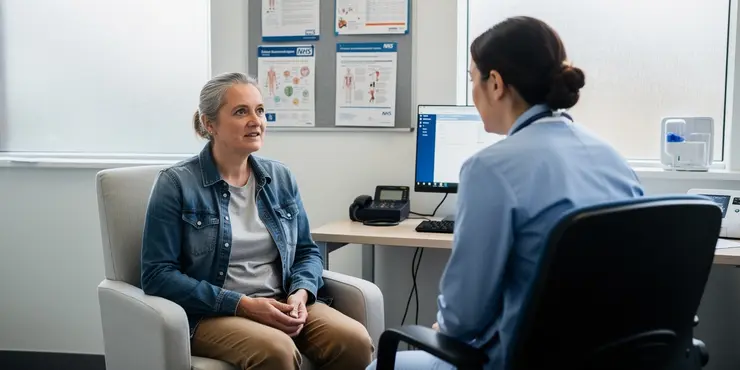
How does post-exertional malaise relate to CFS?
Relevance: 30%
What is Chronic Fatigue Syndrome?
Introduction
Chronic Fatigue Syndrome (CFS), also known as Myalgic Encephalomyelitis (ME), is a complex and debilitating condition. It is characterised by extreme fatigue that cannot be explained by any underlying medical condition. This fatigue worsens with physical or mental activity and does not improve with rest. While its cause is not fully understood, research suggests a combination of factors may be involved.
Symptoms
The primary symptom of CFS is persistent fatigue that affects daily life. However, it is often accompanied by a variety of other symptoms. Individuals may experience sleep problems, muscle or joint pain, headaches, and sore throat. Additionally, memory or concentration issues, often referred to as “brain fog,” are common. Some may notice swollen lymph nodes, while others report digestive issues. The severity and combination of symptoms vary significantly from person to person, which can complicate diagnosis.
Potential Causes
While the exact cause of CFS is still unknown, several potential factors have been studied. These include viral infections, immune system issues, hormonal imbalances, and mental health problems. Some studies have indicated a possible genetic predisposition. It is believed that a combination of these factors might trigger the onset of CFS, particularly following an illness or period of significant stress.
Diagnosis
Diagnosing CFS can be challenging, as there is no specific test for it and its symptoms overlap with many other conditions. Therefore, doctors often rely on ruling out other potential causes of fatigue before diagnosing CFS. Criteria for diagnosis typically include a thorough examination of medical history and the presence of specific symptoms over a prolonged period, usually six months or more.
Treatment and Management
Currently, there is no cure for CFS, but various management strategies can help alleviate symptoms. Treatment plans are highly individualised, often involving a combination of medication and lifestyle changes. Cognitive behavioural therapy (CBT) and graded exercise therapy (GET) have been used with some success, although their effectiveness can vary. Many find relief through changes in diet, stress management techniques, and improved sleep hygiene. Support groups and counselling can also provide emotional support.
Conclusion
Chronic Fatigue Syndrome is a long-term illness that presents with severe fatigue and a wide range of symptoms, impacting quality of life. Though understanding of the condition has improved, much remains to be discovered about its causes and effective treatments. In the UK, continued research and awareness are essential to improve the lives of those affected by this challenging syndrome, providing hope for better management and potential future breakthroughs in treatment.
What is Chronic Fatigue Syndrome?
What is it?
Chronic Fatigue Syndrome, or CFS, is also called ME. It is a health problem that makes you very tired all the time. This tiredness does not get better with rest and can make it hard to do everyday things. Doctors do not know exactly what causes it, but think it might be a mix of different things.
What are the signs?
The main sign of CFS is being very tired. People with CFS also might have trouble sleeping, feel pain in their muscles or joints, get headaches, or have a sore throat. They might also find it hard to remember things or concentrate. Some people have swollen glands or tummy problems. Each person can have different signs, which makes it hard to figure out if someone has CFS.
Why do people get it?
Doctors are not sure why people get CFS. They think it might be linked to virus infections, problems with the body's defense system, hormone changes, or mental health. Some people might be more likely to get it because of their genes. CFS might start after being very sick or stressed.
How is it found out?
It is not easy to find out if someone has CFS, because there is no simple test. Doctors usually have to check for other problems first. They might decide it is CFS if someone has been very tired for at least six months and other signs fit too.
How can it be helped?
There is no cure for CFS, but some things can help. Doctors might suggest a plan that is just for that person. This can include medicine or changes in day-to-day life. Talking therapies like CBT and gentle exercise have helped some people, though not everyone. Eating healthy, managing stress, and getting good sleep can also make things better. Support groups and talking to someone about feelings can help too.
What else should I know?
Chronic Fatigue Syndrome is a long-term illness that makes people very tired and can change their lives a lot. Even though doctors and researchers know more about it now, there is still a lot to learn about how to treat it. In the UK, more research and understanding can help people who have CFS. This gives hope for better ways to manage and treat it in the future.
Frequently Asked Questions
What is chronic fatigue syndrome (CFS)?
Chronic fatigue syndrome, also known as myalgic encephalomyelitis (ME/CFS), is a complex and debilitating condition characterized by extreme fatigue that is not improved by rest and may be worsened by physical or mental activity.
What are the main symptoms of chronic fatigue syndrome?
The main symptoms of CFS include severe fatigue, sleep problems, muscle and joint pain, headaches, flu-like symptoms, and memory or concentration difficulties.
How is chronic fatigue syndrome diagnosed?
CFS is diagnosed based on the patient's symptoms and by ruling out other possible causes of fatigue. There is no specific test for CFS; diagnosis often involves medical history assessments, physical exams, and laboratory tests.
What causes chronic fatigue syndrome?
The exact cause of CFS is unknown, but it may result from a combination of genetic, environmental, infectious, and psychological factors.
Is there a cure for chronic fatigue syndrome?
There is currently no cure for CFS, but treatments that target specific symptoms can help improve quality of life and daily functionality.
How is chronic fatigue syndrome treated?
Treatment for CFS focuses on symptom relief and may include medications, physical therapy, counseling, and lifestyle changes such as stress management and pacing activities.
Can chronic fatigue syndrome be managed with lifestyle changes?
Yes, lifestyle changes such as regular, gentle exercise, a balanced diet, proper sleep hygiene, and stress reduction techniques can help manage symptoms of CFS.
Who is at risk of developing chronic fatigue syndrome?
CFS can affect anyone, but it most commonly occurs in women between the ages of 40 and 60. Risk factors may include stress, genetics, and previous infections.
Is chronic fatigue syndrome a mental illness?
No, CFS is not a mental illness. It is a legitimate, complex physical condition, though psychological support can be beneficial in managing the condition.
Are there psychological aspects to chronic fatigue syndrome?
While CFS is a physical condition, it can have psychological impacts, such as depression and anxiety, which often require additional care.
What role do infections play in chronic fatigue syndrome?
Some people report that CFS started after a viral infection, such as Epstein-Barr virus or COVID-19, which suggests infections may be a trigger for some cases.
How does CFS differ from regular fatigue?
Unlike regular fatigue, the extreme fatigue in CFS is not alleviated by rest, can significantly impair daily activities, and is often accompanied by other severe symptoms.
How does post-exertional malaise relate to CFS?
Post-exertional malaise is a hallmark symptom of CFS, where symptoms worsen significantly after physical or mental exertion, lasting for more than 24 hours.
Can CFS symptoms fluctuate over time?
Yes, CFS symptoms can vary in intensity, with periods of better health and times when symptoms worsen, known as 'crashes' or 'relapses'.
Is chronic fatigue syndrome contagious?
There is no evidence to suggest that CFS is contagious. It is not considered an infectious disease.
Does physical exercise help people with CFS?
Physical exercise needs to be carefully managed. While light, controlled exercise may help some patients, overly strenuous activity can lead to post-exertional malaise.
Can children develop chronic fatigue syndrome?
Yes, CFS can occur in children and adolescents, although it is less common. It often presents similar symptoms as in adults.
What is the prognosis for someone with CFS?
The prognosis varies; while some people improve over time, others may experience ongoing symptoms. Early diagnosis and management can improve outcomes.
Can CFS be prevented?
There is no known way to prevent CFS, as its exact cause is unknown. However, a healthy lifestyle and managing stress and infections may reduce risks.
Why is it important to increase awareness about CFS?
Increasing awareness about CFS helps facilitate better understanding, earlier diagnosis, more research, and improved support and treatment options for those affected.
What is chronic fatigue syndrome (CFS)?
Chronic fatigue syndrome, or CFS, is when you feel very tired for a long time. This tiredness doesn't go away with rest or sleep. It can make it hard to do everyday things.
If you want help to understand CFS, you can:
- Ask a doctor or nurse.
- Use pictures or videos to learn more.
- Talk to someone who knows about CFS.
Chronic fatigue syndrome is also called ME/CFS. It makes you feel really tired all the time. Resting does not help you feel better. Doing things like running or thinking a lot can make it worse.
What are the main signs of chronic fatigue syndrome?
Chronic fatigue syndrome makes you feel very tired all the time. Here are the main signs:
- You feel very tired even after sleep or rest.
- It's hard to concentrate or remember things.
- Your muscles and joints might hurt.
- You might get headaches a lot.
- You could feel dizzy or lightheaded.
If you think you have these signs, talk to a doctor. Ask someone you trust to help you. They can come with you to the doctor.
The big signs of CFS are feeling very tired, having trouble sleeping, sore muscles and joints, headaches, feeling like you have the flu, and having problems remembering things or focusing.
It might help to rest more, ask someone for support, or use a calendar or reminders to remember things better.
How do doctors find out if someone has chronic fatigue syndrome?
CFS is short for Chronic Fatigue Syndrome. It's when someone feels very tired for a long time.
Doctors look at how someone feels and check if there is another reason for the tiredness.
There is no special test for CFS. Doctors will ask questions about how the person feels, check their body, and do some simple tests.
If someone has trouble reading, they can use tools like a text-to-speech program. These programs can read the text out loud to them.
What makes people feel very tired all the time?
We do not know what causes CFS. It might happen because of a mix of things like your genes, the environment, infections, and how you feel.
Can doctors make chronic fatigue syndrome go away forever?
Chronic fatigue syndrome (CFS) is when people feel very tired all the time. Right now, doctors do not have a way to make CFS go away forever.
But doctors can help people with CFS feel better. They might suggest getting lots of rest, eating healthy food, and doing gentle exercises. These can help you have more energy.
It's also good to talk to a doctor or a nurse. They can give good advice and help you find ways to feel better.
Sometimes, special tools like a diary for tracking how you feel can be helpful. Writing down what makes you feel more tired and what helps can be a good way to understand your body better.
There is no cure for CFS right now. But there are treatments that can help with the symptoms. These treatments can help you feel better and do more things each day.
How do doctors help people who feel very tired all the time?
Treatment for CFS helps to make you feel better. It can include taking medicine, going to physical therapy, talking to a counselor, and making changes in your daily life. This might mean managing stress and doing activities more slowly.
Can you feel better from chronic fatigue syndrome by changing how you live?
People with chronic fatigue syndrome often feel very tired. Here are some simple things that might help:
- Rest: Make sure you get enough sleep every night.
- Exercise: Try gentle activities like walking or stretching.
- Food: Eat healthy meals with fruits and vegetables.
- Relax: Do calming activities like listening to music or taking deep breaths.
- Talk to a Doctor: They can help with more advice.
These changes may not make the tiredness go away completely, but they can help you feel a little better.
Yes, you can feel better with some changes in your life. Here are some things that can help:
- Doing gentle exercises regularly.
- Eating healthy foods.
- Getting good sleep.
- Finding ways to relax and not be stressed.
These things can help you feel better if you have CFS (Chronic Fatigue Syndrome).
Who is likely to get very tired for a long time?
CFS can happen to anyone. But it mostly affects women who are 40 to 60 years old. Things that may cause CFS are stress, family history, and past infections.
Is chronic fatigue syndrome a mental illness?
Chronic fatigue syndrome (CFS) is when you feel tired all the time. It can make you feel weak and sore.
CFS is not a mental illness. It is a real illness that affects the body. But feeling tired all the time can also make you feel sad or worried.
If you feel like this, it's good to talk to a doctor or a trusted adult. They can help you feel better.
Using tools like a daily planner can help people with CFS manage their energy. Resting when needed and doing gentle exercise can also be helpful.
No, CFS is not a mental illness. CFS is a real physical illness. It can be hard to understand because it affects the body in many ways. Getting help from a counselor or therapist can be helpful for people with CFS. They can teach good ways to feel better and cope with CFS.
Does chronic fatigue syndrome affect how we feel and think?
Chronic fatigue syndrome, or CFS, is when someone feels very tired for a long time. It might also change how they feel or think.
Doctors think our thoughts and feelings can sometimes make CFS worse. This means feeling sad or worried might make the tiredness feel even stronger.
Talking to someone, like a therapist, can help. They listen and help us feel better.
Some people find it helpful to write in a diary or draw pictures. This can help them show how they feel.
Remember, everyone is different, and it's okay to ask for help.
CFS is a health problem that affects the body. It can also make people feel sad or worried. These feelings might need extra help from someone like a doctor or counselor.
How do germs make you tired all the time?
Sometimes tiny germs, like viruses, can make you feel very tired. This is called chronic fatigue syndrome. It is when you feel really tired for a long time and resting doesn't help.
If you think germs are making you tired, talk to a doctor. It's important to tell them how you feel. Writing down your tired days and what you do might help. You can use pictures or charts too.
Ask someone to help you understand the doctor's advice. Bring a friend or family member with you when you visit the doctor.
Using these tips and tools can make things easier:
- Keep a simple diary of how you feel.
- Use stickers or colors to show tired days.
- Ask for help from family or friends.
Some people say they got CFS after getting sick from a virus, like the Epstein-Barr virus or COVID-19. This means getting sick from a virus might be the reason why some people get CFS.
If you find reading hard, you can:
- Read with someone who can help you understand.
- Take breaks often if you need to.
- Use your finger or a ruler to follow the words.
- Listen to audiobooks or use text-to-speech tools.
What makes CFS different from being tired?
Unlike normal tiredness, the really bad tiredness in CFS does not get better with rest. It can make everyday things very hard to do and usually comes with other bad symptoms.
What is the link between feeling tired after exercise and CFS?
Post-exertional malaise is a key sign of CFS. It means feeling much worse after doing too much exercise or thinking hard. This can last more than a whole day.
Do CFS symptoms change over time?
Yes, CFS symptoms can change. Sometimes they get better, and sometimes they get worse.
If you have CFS, it is important to:
- Rest when you feel tired.
- Talk to your doctor about how you feel.
- Keep a diary of your symptoms to understand what helps you feel better.
Using relaxation tools like deep breathing or listening to calming music can help.
Yes, CFS symptoms can be different in how strong they are. Sometimes you feel better, and other times you feel worse. When you feel worse, it is called a 'crash' or 'relapse'.
Can you catch chronic fatigue syndrome from someone else?
There is no proof that CFS spreads from person to person. It is not a sickness that you can catch from someone else.
Can exercise help people with CFS (Chronic Fatigue Syndrome)?
People with CFS feel very tired.
Exercise can be good for the body.
Start with small exercise, like a short walk.
Go slowly and do not push too hard.
Talk to a doctor before you start.
Listening to your body is important.
Keep a journal of how you feel after exercise.
Use relaxation techniques, like deep breathing, to help relax.
Exercise can be good for you if you do it the right way. Easy exercise can help some people feel better. But if you exercise too hard, it can make you feel very tired and unwell.
If you are not sure how to exercise safely, you can ask a doctor or a fitness teacher for help. They can show you the right kind of exercise that won't make you too tired.
You can also try tools like a step counter or a timer to help you keep track of your exercise. These tools can remind you when to stop and rest.
Can children get chronic fatigue syndrome?
Chronic fatigue syndrome means feeling very tired for a long time.
Yes, children can get it.
If you think your child is always very tired and it won't go away, talk to a doctor.
Here are some tools and tips to help:
- Use simple words when talking about how they feel.
- Keep a diary of when they feel tired.
- Rest often and take breaks during the day.
- Make sure they have a regular sleep routine.
Yes, kids and teenagers can get CFS, but it's not as common. It looks a lot like CFS in grown-ups.
What is the outlook for someone with CFS?
CFS is short for Chronic Fatigue Syndrome. This means feeling very tired all the time. It can make doing daily activities hard.
The outlook means what might happen in the future. With CFS, some people get better over time, but it can take a while. Others might still feel tired a lot.
It's important to rest and take care of the body. Talking to a doctor can help. They can give advice and support.
Using a diary to track sleep and activities can be helpful too. This makes it easier to see what helps or what makes things worse.
How people get better can be different. Some people feel better over time, but others might still have problems. Finding out what is wrong early and getting help can make things better.
Can we stop CFS from happening?
No one knows for sure how to stop CFS. But there are things that might help:
- Try to get enough rest and sleep each night.
- Eat healthy foods like fruits and vegetables.
- Exercise a little bit regularly, but don't overdo it.
- Stay away from stress as much as you can.
- Wash your hands to stay clean and avoid getting sick.
If you need help understanding or remembering things, you can:
- Ask someone you trust to explain it to you.
- Use pictures or drawings to help you learn.
- Write down what you learn in a simple way.
We don't know how to stop CFS from starting because we don't know what causes it. But, you can try to stay healthy and manage stress and sickness to help keep it away.
Why should we learn more about CFS?
CFS stands for Chronic Fatigue Syndrome. It makes people feel very tired even when they rest. Learning about CFS helps us understand what people with CFS go through. When we know more, we can be kinder and more helpful.
Here are some ways to learn more:
- Books: Read simple books about CFS.
- Videos: Watch videos that explain CFS in easy words.
- Talk: Speak with doctors or people who know about CFS.
If you feel unsure, you can ask a friend or a teacher to help you learn.
Knowing more about CFS is important. It helps people understand it, find out they have it sooner, and get the right help. Learning about CFS also helps scientists do more research and make better treatments.
Useful Links
This website offers general information and is not a substitute for professional advice.
Always seek guidance from qualified professionals.
If you have any medical concerns or need urgent help, contact a healthcare professional or emergency services immediately.
Some of this content was generated with AI assistance. We’ve done our best to keep it accurate, helpful, and human-friendly.
- Ergsy carfully checks the information in the videos we provide here.
- Videos shown by Youtube after a video has completed, have NOT been reviewed by ERGSY.
- To view, click the arrow in centre of video.
- Most of the videos you find here will have subtitles and/or closed captions available.
- You may need to turn these on, and choose your preferred language.
- Go to the video you'd like to watch.
- If closed captions (CC) are available, settings will be visible on the bottom right of the video player.
- To turn on Captions, click settings .
- To turn off Captions, click settings again.
More Items From Ergsy search
-

Is chronic fatigue syndrome contagious?
Relevance: 100%
-
What is chronic fatigue syndrome?
Relevance: 96%
-

What causes chronic fatigue syndrome?
Relevance: 96%
-

Are there psychological aspects to chronic fatigue syndrome?
Relevance: 92%
-
Is chronic fatigue syndrome a mental illness?
Relevance: 90%
-

Who is at risk of developing chronic fatigue syndrome?
Relevance: 85%
-
Can children develop chronic fatigue syndrome?
Relevance: 85%
-

What role do infections play in chronic fatigue syndrome?
Relevance: 83%
-

How is chronic fatigue syndrome treated?
Relevance: 78%
-

Is there a cure for chronic fatigue syndrome?
Relevance: 77%
-

Myalgic encephalomyelitis or chronic fatigue syndrome (ME/CFS) | NHS
Relevance: 72%
-

How is chronic fatigue syndrome diagnosed?
Relevance: 72%
-

Can chronic fatigue syndrome be managed with lifestyle changes?
Relevance: 63%
-

How does CFS differ from regular fatigue?
Relevance: 46%
-

What is Cushing's syndrome?
Relevance: 39%
-

What is irritable bowel syndrome (IBS)?
Relevance: 37%
-

Prader-Willi Syndrome | NHS
Relevance: 35%
-

Can fatigue result in dangerous driving?
Relevance: 34%
-

Carpal Tunnel Syndrome
Relevance: 34%
-

Munchausen's syndrome | NHS
Relevance: 34%
-

Symptoms of irritable bowel syndrome (IBS)
Relevance: 33%
-

What causes Carpal Tunnel Syndrome?
Relevance: 33%
-
Can weight loss medications cause fatigue?
Relevance: 32%
-

About irritable bowel syndrome (IBS)
Relevance: 32%
-

What is Carpal Tunnel Syndrome (CTS)?
Relevance: 32%
-

Having a child with Down's syndrome | NHS
Relevance: 32%
-

Down's syndrome: Emily's story | NHS
Relevance: 32%
-

What is post-treatment Lyme disease syndrome (PTLDS)?
Relevance: 32%
-

Charles Bonnet Syndrome
Relevance: 31%
-

What is congenital rubella syndrome?
Relevance: 31%
-

Managing Chronic Illness Within the Family
Relevance: 31%
-

Is Carpal Tunnel Syndrome covered by the NHS?
Relevance: 31%
-

Turner syndrome: Beyond the classic XO phenotype
Relevance: 31%
-

Exercises for sciatica: piriformis syndrome | NHS
Relevance: 31%
-

Can CFS be prevented?
Relevance: 31%
-

How is Carpal Tunnel Syndrome diagnosed?
Relevance: 31%
-

Are there any alternative treatments for Carpal Tunnel Syndrome?
Relevance: 31%
-

What is complex sleep apnea syndrome?
Relevance: 31%
-

What is complex sleep apnea syndrome?
Relevance: 31%
-

How does post-exertional malaise relate to CFS?
Relevance: 30%


